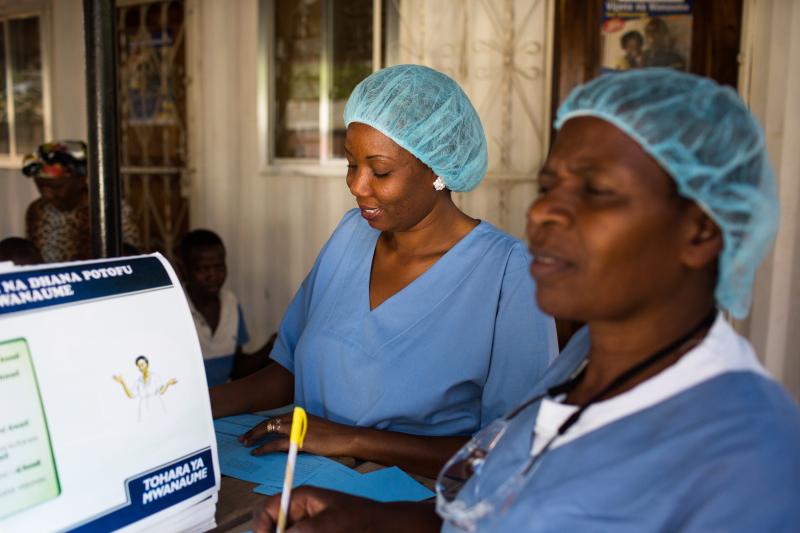Where We Work
See our interactive map


There are 412 qualified public-sector VMMC providers in the 5 regions IntraHealth supports—and 88% are nurses. Photo by Trevor Snapp for IntraHealth International.
"At last, the nation recognizes nurses can do more than nursing care.”
Today about 1.4 million Tanzanians live with HIV, or 4.7% of adults. The country has been struggling with both a high HIV prevalence rate and a shortage of the health workers they need to tackle this challenge.
IntraHealth International has been scaling up voluntary medical male circumcision (VMMC) services to help prevent HIV for the past six years in Tanzania, in partnership with the Ministry of Health, Community Development, Gender, Elderly and Children; the National AIDS Control Program; and the President’s Office Regional Administration and Local Government.
Male circumcision reduces the risk of female-to-male sexual transmission of HIV by up to 60%. So we’ve been working together to offer the service in 16 districts in five Lake Zone regions under the President’s Emergency Plan for AIDS Relief (PEPFAR) through the US Centers for Disease Control and Prevention.
How could these busy, remote health centers meet the needs of the millions of Tanzanian men?
When we launched this work, we asked ourselves: How can we build sustainable capacity among Tanzania’s health workers so more of them can provide this life-saving service within the country’s existing health system?
The answer, we found, was nurses.
IntraHealth’s country leader in Tanzania, Dr. Lucy Mphuru (a skilled VMMC surgeon herself), knew that answers would lie with the respective ministries, regional and district authorities, and health sector stakeholders. She spent hours meeting with these leaders, asking for their ideas in joint brainstorming sessions attended by all national, regional, and district stakeholders.
We did not want to hire contract health workers—we knew investing in local permanent staff would be more sustainable.
So how could these busy hospitals and health centers, many in remote areas, meet the needs of the millions of Tanzanian men seeking access to these services? Particularly when Tanzania’s physicians and surgeons—previously the only health workers qualified to perform VMMC procedures—are so busy and so few?
The ministerial leaders agreed upon a task-shifting approach. National VMMC trainers from the ministry and IntraHealth would develop regional and district capacity by training regional VMMC mentors and trainers, who would in turn train public-sector nurses in their respective regions and districts to perform VMMC—thereby making the services more widely available and freeing up time for physicians to help clients with more complex needs.
And advance planning was key—health facility matrons had to manage the schedules to ensure other health services were not paralyzed when, for example, nurses were pulled from the male, surgical, or pediatric wards.
Today, there are 412 qualified public-sector VMMC providers in the 5 regions supported by IntraHealth—and 88% of those are nurses trained and certified by the ministry and the National AIDS Control Program as VMMC providers:
These nurses have the opportunity to make a real difference for their country—to help Tanzania control its HIV epidemic. They uproot their lives for four weeks at a time, traveling away from their families to stay at rural outreach posts, where they talk with local community members about the benefits of VMMC, counsel clients, and provide surgical and post-circumcision services.
In talking with them, we’ve found that their greatest motivation is helping making a difference in the lives of their communities. And they feel appreciated for their service.
“At last, the nation recognizes nurses can do more than nursing care,” says Ndibicoy Nyamati, a 35-year-old registered nurse from Fumagila Dispensary who was trained in VMMC in 2016. “We take care of all clients’ needs, from surgery to nursing care. I am so proud of myself—I have successfully circumcised more than 100 boys and men.”
Next year, we’ll be expanding to cover 28 districts.
So far, we’ve rolled out both static and outreach VMMC services in a large geographic Lake Zone area around Lake Victoria. And we’re reaching adolescents and men 10-29 years of age, particularly those at the ages of greatest risk (15-29), in regions where traditional male circumcision was not practiced and HIV prevalence rate is high.
During each four-week program, we offer VMMC services at 35-40 outreach sites simultaneously, with 7-10 health workers at each site. This means close to 300 nurses are mobilized for each of the eight four-week outreach campaigns. Together we’re working to help Tanzania achieve the UNAIDS 90-90-90 vision by 2020, meaning that 90% of people living with HIV know their status, 90% of people who know their status have treatment, and 90% of people on treatment have suppressed viral loads.
In the first year of the project (2016-2017), more than 225,000 men and boys chose to receive VMMC services. And nearly all of them (89%) returned as advised for postcircumcision follow-up care within 14 days. Less than 0.2% reported adverse results post-procedure, an indication of high-quality care. All reported complications were successfully treated and managed.
Next year, we’ll be expanding to cover 28 districts in 5 regions.
Now our challenge is to help the government of Tanzania achieve its goals of attaining 80% coverage and ensure that even more men—particularly in the 15-29 age range—have access to these services. We’re also working with respective ministries to develop a time-sequenced sustainability plan to transition this work to the government of Tanzania.
IntraHealth’s HIV-related work in Tanzania is funded by President’s Emergency Plan for AIDS Relief (PEPFAR) through the US Centers for Disease Control and Prevention.
Get the latest updates from the blog and eNews




